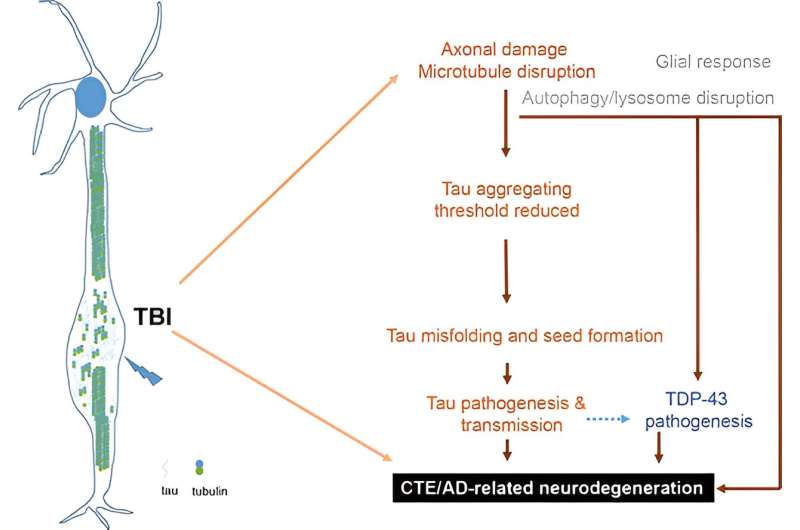This article has been reviewed according to Science X's editorial process and policies. Editors have highlighted the following attributes while ensuring the content's credibility:
fact-checked
peer-reviewed publication
trusted source
proofread
Researchers show how repeated traumatic brain injury contributes to Alzheimer's disease

The causes of Alzheimer's disease (AD) are unclear, and the interventions for AD are very limited. However, researchers led by Prof. He Zhuohao from the Shanghai Institute of Organic Chemistry of the Chinese Academy of Sciences, in collaboration with researchers worldwide, have recently proposed a new strategy for the intervention in certain neurodegenerative diseases, including AD, based on a better understanding of disease mechanisms. Their study was published in Science Translational Medicine.
AD is the most common cause of dementia. Protein deposits are the hallmark of AD and many other related neurodegenerative diseases. Deposit burden correlates well with disease progression in patients. The vast majority of these disease cases are sporadic and have no apparent obvious genetic cause. Elucidating the causes that lead to protein pathogenesis and neurodegeneration is critical for early diagnosis and intervention of AD and other related devastating diseases.
Reports indicate that people with repeated traumatic brain injury (rTBI), such as football players and boxers, have a higher incidence of developing AD-related protein pathogenesis, including tau and TDP-43 pathologies. Therefore, rTBI is considered as a risk factor for such neurodegenerative diseases. However, until now the experimental evidence for a direct link has been lacking, and the underlying mechanisms have been unclear.
The current study helps explain why people experiencing frequent head concussions have a higher risk of developing AD-related dementia. It shows that rTBI not only promotes de novo tau pathogenesis, but also facilitates existing pathological tau transmission and spread in various mouse models.
Specifically, the researchers demonstrated that axonal microtubule disruption is one of the molecular mechanisms underlying rTBI-induced protein pathogenesis and neurodegeneration. As a result, the researchers suggested that properly maintaining axonal microtubule stability, such as through a brain-penetrating microtubule-stabilizing compound, could reduce rTBI-induced microtubule damage, protein accumulation, tissue degeneration and behavioral deficits.
More information: Xinyi Zhao et al, A microtubule stabilizer ameliorates protein pathogenesis and neurodegeneration in mouse models of repetitive traumatic brain injury, Science Translational Medicine (2023). DOI: 10.1126/scitranslmed.abo6889





















